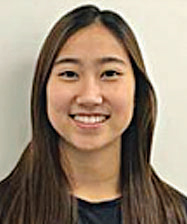
Jiyoon Hwang William Fremd HS Palatine, IL 11th Grade
Ever since the first big wave of Korean immigrants in 1903, numerous ideas and motives were brought from mainland Korea to the ‘Land of the Free.’ In 2001, I joined this ever-growing group of Korean immigrants, and have since grown into the personage that I identify with to this day: a Korean-American. I came to the United States because of my father’s dream of starting his own business in a country with seemingly limitless opportunities for growth, but his story and mine proved to be on completely different spectrums.
As a Korean-American student attending a white-privileged school, I had firsthand experience of the racism directed to Asian Americans. During middle school, I fell in love with tennis and ambitiously joined my high school’s tennis team with high hopes of competing and improving my skills. I had no intention of letting any individual take that passion away from me. However, my dreams were crushed after my Korean friends and I experienced discrimination from the coaches. On the first day of practice, our coach assigned each player to a court and indirectly assigned all the Asians to the farthest court, whereas the other players were assigned to the middle, most visible court. Though I was skeptical of the rationale behind our assignments, I just let it go at first, telling myself that it was simply a coincidence that all the Asians, including myself, were pushed to the farthest court. My friends and I began to practice on our own, and we all expected the coaches to at least watch our progress once. Yet, none of the coaches-not even one-came towards our court that day nor throughout the whole season. With situations like this, some of my friends began to feel embarrassed about their Asian backgrounds, and I cannot deny the fact that I felt the same way in these particular situations.
However, this personal experience led me to become more aware of the fact that Asian Americans are rarely thought of as “true” Americans. Even the second-generation Asian Americans who were born in the United States are bound to hear racist comments and experience discrimination. Even President Trump, a high-profile figure who I expect to embrace the diversity of the American people, could not restrain himself from making a comment that was rather unprecedented to a Korean American career intelligence analyst during a White House briefing in the Fall of 2017. He interrupted the briefing to ask the analyst where she was from and when she answered “New York,” Trump was unsatisfied. He again asked, in a slightly different way, where “her people” were from to which she revealed that her parents were Korean. Afterwards, Trump suggested the analyst be reassigned to working on issues regarding North Korea and ultimately put in charge of nuclear negotiations. Despite differences in ethnic backgrounds, Asians should not be deterred from reaching their full potentials or restricted to the abundant stereotypes that exist.
Furthermore, being Korean American means adjusting to two separate cultures and their differing values. From my perspective, the Korean culture, on one hand, stresses familism, respect for elders, and proper education, whereas the American culture emphasizes individualism, informal and casual relationships, and freedom of choice. Digesting all these different cultural values can be a little overwhelming for any one individual, but I believe there is one thing that has allowed me to accomplish such a feat: language.
My parents have always instilled in me the notion that a Korean individual like myself should have fundamental knowledge of the Korean language. As a young child gradually becoming accustomed to the American culture that makes up my social environment, I questioned whether I really needed to learn the Korean language to the extent my parents wanted me to. I had no intention of going back to live in Korea, and it seemed that my parents didn’t either. So, what was the big deal? It was only recently that I’ve come to realize its importance. By knowing the Korean language, I am able to learn about the Korean culture and it nuances from friends, colleagues and family that I cannot find in a textbook, while at the same time appreciating the American way of life. This ultimately allows me to be able to embrace both identities that make up who I am. Especially in a world where many people still cannot accept other people’s ethnicities and races, it is evermore crucial to hone in on one’s identity, and my knowledge of the Korean language gives me the confidence to do just that.
As a Korean-American, I can demonstrate to the world that an immigrant living in a country with a majority of Caucasians will not be hindered by obstacles such as racism and limited opportunities. Although it may be difficult adjusting to a new culture that is not completely open to other races, I would like to empower other Korean-Americans to not hold back their identities, but to rather embrace it and display it with confidence. I plan to put this idea into practice by becoming a translator for ambassadors and diplomats who represent Korea and the United States. By serving as the liaison between these individuals, I can confidently display both my Korean and American identity and become a role model figure to others who have had similar experiences to me to not be embarrassed of any one of their cultures. We may be categorized and stereotyped as nerdy, overachievers, and socially unapproachable in this country, but I see the need for us to push through and display our full potentials in order to live in a world that is growing evermore global.
[경운장학회 영어웅변대회 Third place Winner]
<
Jiyoon Hwang William Fremd HS Palatine, IL 11th Grade>

